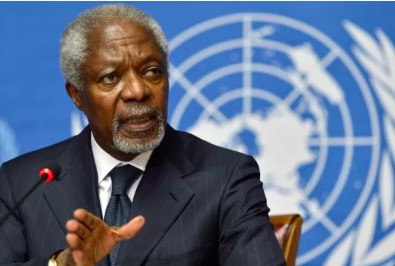… EDUCATION FOR PEACE …
An article by CPNN
As we mourn the death of Kofi Annan, we recall his inspiring leadership as the Secretary-General of the United Nations. The following is his message for the occasion of the International Day of Peace, 14 September, 1999:

“The principal mandate of the United Nations to save succeeding generations from the scourge of war remains as valid today as when those words were written into the Charter more than half a century ago. For millions upon millions of people throughout our world, the march of human progress continues to be plagued by conflict, violence, hatred and greed.
“Over the years we have come to realize that it is not enough to send peacekeeping forces to separate warring parties. It is not enough to engage in peace-building efforts after societies have been ravaged by conflict. It is not enough to conduct preventive diplomacy. All of this is essential work, but we must also act at a deeper level if we want enduring results. We need, in short, a culture of peace.
(Articles continued in right column)
Where in the world can we find good leadership today?
(continued from left column)
“It may seem sometimes as if a culture of peace does not stand a chance against the culture of war, the culture of violence and the cultures of impunity and intolerance. Peace may indeed be a complex challenge, dependent on action in many fields and even a bit of luck from time to time. It may be a painfully slow process, and fragile and imperfect when it is achieved. But peace is in our hands. We can do it.
“This year, the International Day of Peace coincides with the launch, at the initiative of the United Nations Educational, Scientific and Cultural Organization (UNESCO), of the International Year for the Culture of Peace. Since wars begin in the minds of men, says UNESCOs Constitution, it is in the minds of men that the defences of peace must be constructed. All of us must do our part in this project. The culture of peace is an idea whose time has come.”
The preceding press release from Kofi Annan on September 10, 1999, echoed the following remarks made by Ambassador Anwarul Chowdhury two weeks earlier upon the adoption by the UN General Assembly of the Declaration and Programme of Action on a Culture of Peace. That document, which remains to this day the key forumulation of a culture of peace, had been introduced a year before by Director-General Federico Mayor of UNESCO and guided through a difficult birth process by Ambassador Chowdhury:
“I believe that this document is unique in more than one way. It is a universal document in the real sense, transcending boundaries, cultures, societies and nations. Unlike many other General Assembly documents, this document is action-oriented and encourages actions at all levels, be they at the level of the individual, the community, the nation or the region, or at the global and international levels. The document also brings together the various actors who have a role in advancing a culture of peace. They include States, international organizations, civil society, community leaders, parents, teachers, artists, professors, journalists, humanitarian workers – in a way, all people from all walks of life and all sorts of backgrounds can contribute to its implementation.”